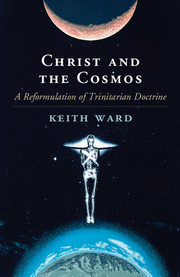Book contents
- Frontmatter
- Contents
- Preface
- Acknowledgements
- PART I THE THREEFOLD NATURE OF THE DIVINE BEING
- 1 Introduction: Talking about the Trinity
- 2 Why We May Need to Restate the Ways in Which We Talk about the Trinity
- 3 The Doctrine of Divine Simplicity
- 4 Cosmological and Axiological Explanation
- 5 Divine Potentiality and Temporality
- PART II THE BIBLICAL SOURCES OF TRINITARIAN THOUGHT
- PART III THE TRINITY, IMMANENT AND ECONOMIC
- PART IV THE SOCIAL TRINITY
- PART V THE COSMIC TRINITY
- Bibliography
- Subject Index
- Name Index
2 - Why We May Need to Restate the Ways in Which We Talk about the Trinity
from PART I - THE THREEFOLD NATURE OF THE DIVINE BEING
Published online by Cambridge University Press: 05 September 2015
- Frontmatter
- Contents
- Preface
- Acknowledgements
- PART I THE THREEFOLD NATURE OF THE DIVINE BEING
- 1 Introduction: Talking about the Trinity
- 2 Why We May Need to Restate the Ways in Which We Talk about the Trinity
- 3 The Doctrine of Divine Simplicity
- 4 Cosmological and Axiological Explanation
- 5 Divine Potentiality and Temporality
- PART II THE BIBLICAL SOURCES OF TRINITARIAN THOUGHT
- PART III THE TRINITY, IMMANENT AND ECONOMIC
- PART IV THE SOCIAL TRINITY
- PART V THE COSMIC TRINITY
- Bibliography
- Subject Index
- Name Index
Summary
Perhaps it is important at this point to say that when I raise problems I am not meaning to undermine the point and profundity of Christian belief in God as Trinity. Quite the opposite – I am seeking a way of bringing out the profoundness and spiritual relevance of Trinitarian belief for the modern world. The problems I will discuss are problems of finding ways of saying things which are at the very limits of human comprehension – which are, as the Athanasian Creed puts it, ‘incomprehensible’.
Of course, if something is completely incomprehensible it is just nonsense. But for most of us there are many things that we are unable to comprehend even though someone else may have a pretty good grasp of them. For instance, the Schrödinger equation, as used in quantum physics, is something that many of us just cannot understand. We can learn it, we can see that it is used, but we just cannot really see what it means. It is quite possible to see that an equation is useful, even to learn to repeat it and to see roughly how it works, yet fail to understand it.
An even better example would be the wave-particle duality of light. I think I am safe in saying that no one can understand how light can behave both in wave-like and in particle-like ways (in John Wheeler's ‘delayed choice’ version of the two-slit experiment, for example). There is no doubt, however, that it does, and various models have been invented to try to explain the mystery of it. We can
see that there are good reasons for positing such a duality. What we cannot see is what sort of objective reality can account for the duality – though we assume that there is such a reality.
By analogy, we might see that there are good reasons for referring to God variously as Father, Son, and Spirit, and for insisting that there is just one God. But we might not be able to understand the sort of objective reality which would account for the appropriateness of our linguistic references. If this sort of analogy holds, we see how we could say that we cannot understand the reality of God, as it is in itself, but that we can see the appropriateness, perhaps the necessity, of referring to God, perhaps for different purposes, as both one and three.
- Type
- Chapter
- Information
- Christ and the CosmosA Reformulation of Trinitarian Doctrine, pp. 6 - 10Publisher: Cambridge University PressPrint publication year: 2015



